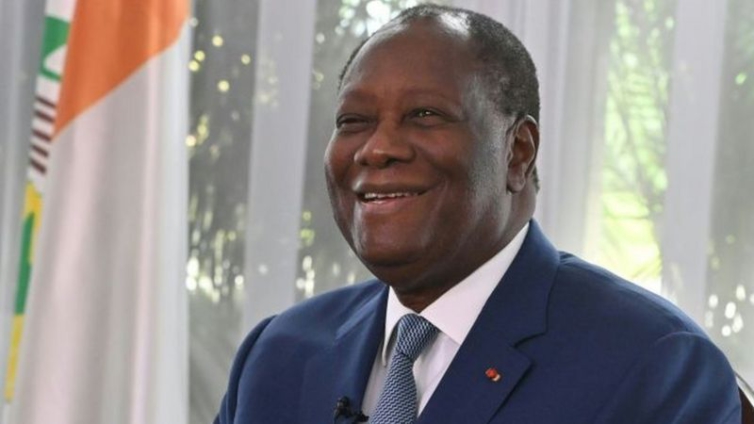
Audio By Carbonatix
Ivory Coast's President Alassane Ouattara has won a controversial third term in office in an election boycotted by the opposition.
He took 94% of the vote, even winning 99% in some of his strongholds.
Turnout was put at almost 54%. The result has to be confirmed by the Constitutional Council.
On Monday, the Ivorian opposition said it was creating a transitional government which would organise a new election.
Main opposition candidates Pascal Affi N'Guessan and Henri Konan Bédié had urged their supporters not to vote.
Opposition figures say it was illegal for Mr Ouattara to stand for a third term as it broke rules on term limits.
But the president's supporters dispute this, citing a constitutional change in 2016 which they say means his first term effectively did not count.
At least 16 people have been killed since riots broke out in August after President Ouattara said he would run again following the sudden death of his preferred successor.
At least nine people were killed during Saturday's vote, news agency AFP reports.
What happened on Saturday?
The election was marred by intimidation, violence and electoral malpractice, an advocacy group said of findings by independent election group Indigo Côte d'Ivoire.
"An election is the moment when a society comes together to experience and live out democracy, but the context that prevailed on election day... shows that a large segment of the Ivorian population did not experience this election in peace," PTI Advocacy Group said in a statement.
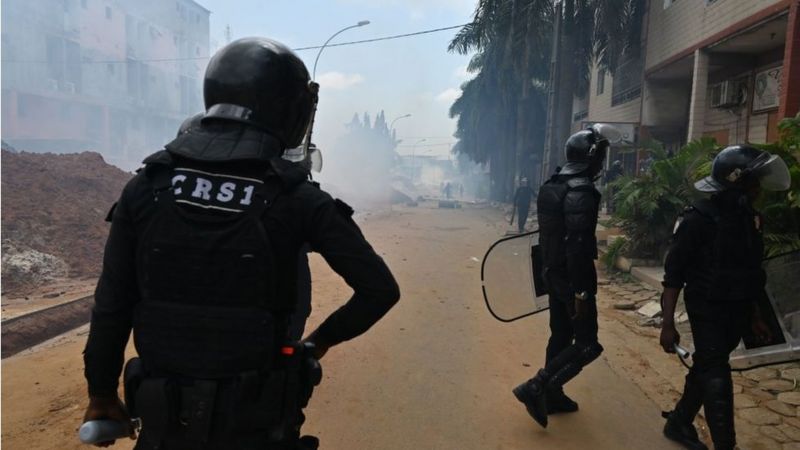
It added that a significant number of voters were disfranchised because polling stations did not open, adding that even those people who were able to vote did so "in a context of fear and anxiety".
It said that 23% of polling stations had not opened at all due to threats or attacks and that in 5% of polling stations, observers reported threats or intimidation of election officials.
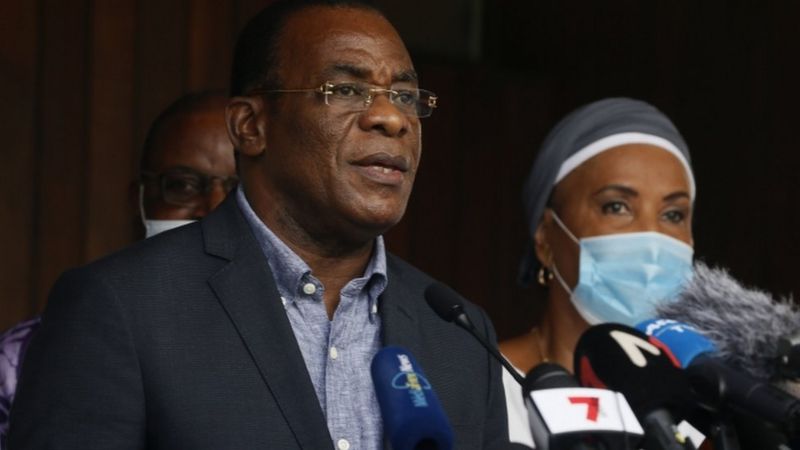
Several polling stations were ransacked in opposition strongholds on Saturday and election materials were burned.
In the eastern town of Daoukro, protesters erected roadblocks. Meanwhile tear gas was used to push away demonstrators who gathered close to where the president cast his ballot in the main city, Abidjan.
Opposition leader Mr N'Guessan told reporters on Sunday ahead of the results that say they considered Mr Ouattara's mandate to be over:
"[We] note the end of President Alassane Ouattara's mandate on 31 October and call on the international community to take note," he added, saying a civil transition was needed to "create the conditions for a fair, transparent and inclusive election."
What do the authorities say?
The electoral commission head called the disturbances on Saturday "minimal", saying they "only affected 50 polling stations out of 22,381".
Some 35,000 security officers were deployed across the country to transport election materials and ensure safety, the security minister said.
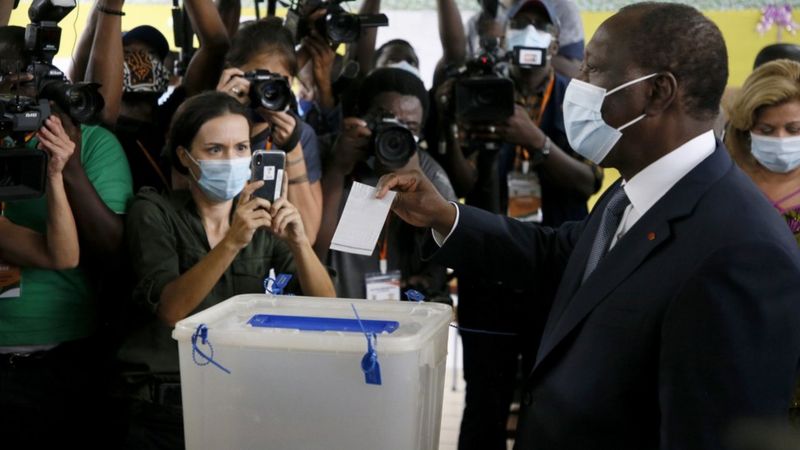
After voting in Abidjan on Saturday, Mr Ouattara called for an end to the protests.
"I call on those who called for civil disobedience, which led to the loss of life, to stop," he said.
"They should stop because Ivory Coast needs peace, these are criminal acts and we hope that all this can stop, so that after the election this country may continue on its course of progress, which it has enjoyed over the last few years."
Why was the election controversial?
According to the constitution, Ivory Coast has a two-term presidential limit. Mr Ouattara - who has been elected twice - initially said he would stand down.
But, in July, the ruling party's previous presidential nominee, Prime Minister Amadou Gon Coulibaly, died of a heart attack.
Mr Ouattara subsequently announced that he would run for president after all.
His supporters argued that a constitutional change in 2016 reset the clock and that his first term did not count.
His opponents do not share that view, arguing instead that it is illegal for Mr Ouattara to run for a third term.
What's the background to the tension?
There has been a decades-long quarrel between some of the country's leading political figures.
In 2010, Laurent Gbagbo, who was president at the time, refused to concede to Mr Ouattara following the election that year. This sparked a bitter civil war.
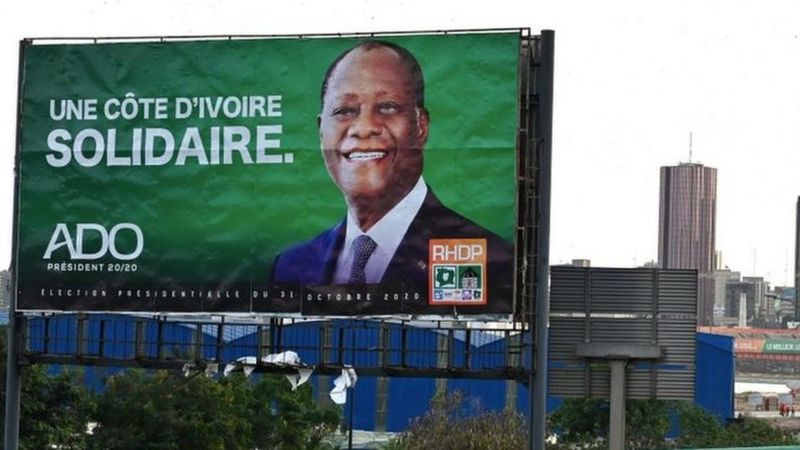
More than 3,000 people were killed in the five months of violence.
Mr Gbagbo also put himself forward to stand in this year's election but the electoral commission blocked him because he had been convicted in the Ivorian courts.
He was one of nearly 40 potential candidates who were turned down by the commission.
Who were the presidential candidates?
- Alassane Ouattara, 78, economist. Became president in 2011, serving his second term after years in opposition. Party: Rally of Houphouëtists for Democracy and Peace (RHDP)
- Henri Konan Bédié, 86, career politician. Served as president between 1993 and 1999, deposed in coup. Party: Democratic Party of Ivory Coast (PCDI)
- Pascal Affi N'Guessan, 67, career politician. Served as prime minister between 2000 and 2003 under then-President Laurent Gbagbo. Party: Ivorian Popular Front (FPI) faction
- Kouadio Konan Bertin, 51, career politician, known as KKB, was once youth leader in the former ruling Democratic Party of Ivory Coast, is now an MP. Independent candidate
Latest Stories
-
Life begins at 40: A reflection on experience and leadership
20 minutes -
Maresca leaves Chelsea after turbulent end to 2025
43 minutes -
NPP still hurting after 2024 loss – Justin Kodua
54 minutes -
Ghana declares war on illegal streaming of pay-TV content
56 minutes -
Vice President leads 44th anniversary commemoration of 31st December Revolution
57 minutes -
Valencia coach Fernando Martin dies in Indonesia boat accident
1 hour -
Nigeria AG’s intervention brings relief to River Park estate investors – JonahCapital
1 hour -
High number of youth behind bars is a national loss – Ashanti regional prisons commander
2 hours -
Nhyira Aboodoo shifts to monumental projects, injects GH₵270,000 into Ashanti orphanages
2 hours -
Police restores calm after swoop operation at Aboso
2 hours -
Through thick and thin in 2025: KGL Group makes national, global impact
2 hours -
Clean Air Fund sets 2026 targets, pushing gov’t toward funding, tougher laws and real health gains on air pollution
3 hours -
New Year begins with 15.92% water and 9.86% electricity tariff hikes
3 hours -
TUC, PURC call for calm amid power tariff concerns, assure public of stakeholder engagement
3 hours -
New VAT is a game changer for Ghana’s revenue collection – GRA Boss
3 hours

